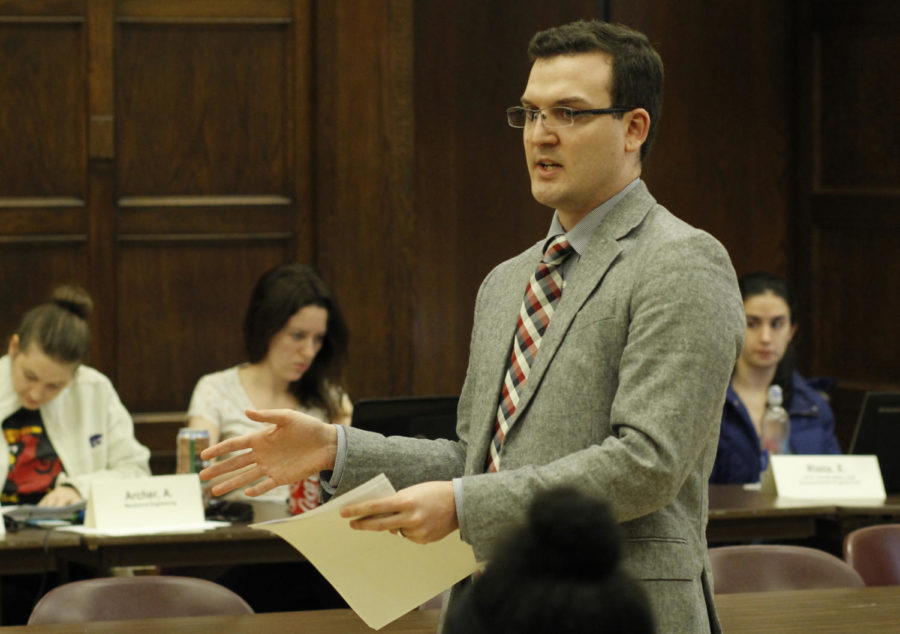GPSS passes bills, elects new executives
Members of the Graduate and Professional Student Senate gather in the Great Hall of the Memorial Union for a meeting on March 28.
March 28, 2016
The Graduate and Professional Student Senate met Monday to move forward on passing a Constitutional Amendment and vote for next year’s executive office positions.
Vivek Lawana, current research conference chair, was elected as president for GPSS with 68 percent of the vote, beating out George Weston.
Bharat Agrawal, current chief information officer, ran unopposed and was elected with unanimous consent for vice president.
John Hsieh, junior senator, ran unopposed for treasurer. He was elected with unanimous consent.
Weston was nominated to run against the previously unopposed Huanjiao Dong for chief information officer. Weston was elected for the position.
At press time, the positions for University Relations Legislative Affairs Chair, which Shivani Ghaisas ran unopposed for; Professional Advancement Grants Chair, which Muhammed Walugembe ran unopposed for and Research Conference Chair, which Akshit Peer ran unopposed for, were not yet voted on.
The years-long issue of representation and how senators are elected may be coming to an end. The current constitution has senators elected by their department, not their major, which leaves some majors that cross between departments left out. Instead of going through the registrar’s broken link in the constitution, the amendment will look to majors for senators to represent through Iowa State’s eData warehouse.
The amendment must pass three times in order to be added to the constitution. It passed in February with 98 percent approval and again Monday night with 95 percent approval. The bill will be passed to next year’s Senate in order to be voted on again and then approved.
A new Senate bill was added to the agenda at the beginning of the night. A bill for spring allocations to student groups was passed at 98 percent. The bill will provide funding to multiple graduate student organizations.
The revisions to chapter nine of the graduate student handbook are slated to be discussed and voted on by the Graduate Council in April. Faculty provided feedback to the proposed Bill of Rights and suggested that the Rights and Responsibilities of graduate students be split into “fundamental rights” and “best practices that are encouraged by the graduate college.”
Corey Williamson, interim director of the Memorial Union, and Michael Snook, vice president on the Board of Directors for the Memorial Union, introduced the feasibility study conducted with students in response to the proposed upheaval of the current Memorial Union.
Williamson said the Memorial Union is “a resource for everyone on campus: all students, all faculty [and] all staff,” which is why he thinks the project should be passed and funding should be allocated.
Snook discussed the future plans for the upheaval, primarily turning the hotel into space used by student organizations because “having a hotel centrally located on the campus is not the best way to meet the needs of the students.”
Williamson described how the different floors of the Memorial Union would change during the course of five years of the project. The only student service located on the sixth floor would be Student Legal Services, to provide privacy to students in need.
The fifth floor would house more student services such as Event Management and the Lectures Program. The fourth floor would house the international student offices. The third floor would primarily be devoted to student organizations. The first floor would receive an increase of 200 dining seats, and Recreation Services would be relocated to the first floor.
The Maintenance Shop would be minimally impacted by the project; however, the bowling alley located in the basement of the Memorial Union would be essentially eliminated.
“This would increase space that will accommodate growth for student organizations and recreational space,” Williamson said.
The changes to the Memorial Union do not come without a price, and Williamson said that price would likely begin as soon as the project is approved, which he hopes is in the spring of 2017. The fee has been estimated to be about $100 additional to the current student fee, but Williamson said the student fee would begin when “students identify an amount they feel is appropriate.”
Williamson also said Iowa State has the lowest student fee out of the three regents, which if increased, would be similar to the other institutions and likely create a large change on campus.
The graduate senators and students are concerned about their representation and communication with Student Government, which Student Government president Dan Breitbarth said is because of the graduation of one of his cabinet members and graduate liaison, Neil Vezeau. Both GPSS and Student Government are working together to resolve this communication issue.
GPSS will next meet at 6:30 p.m. April 25 in the South Ballroom of the Memorial Union.

















